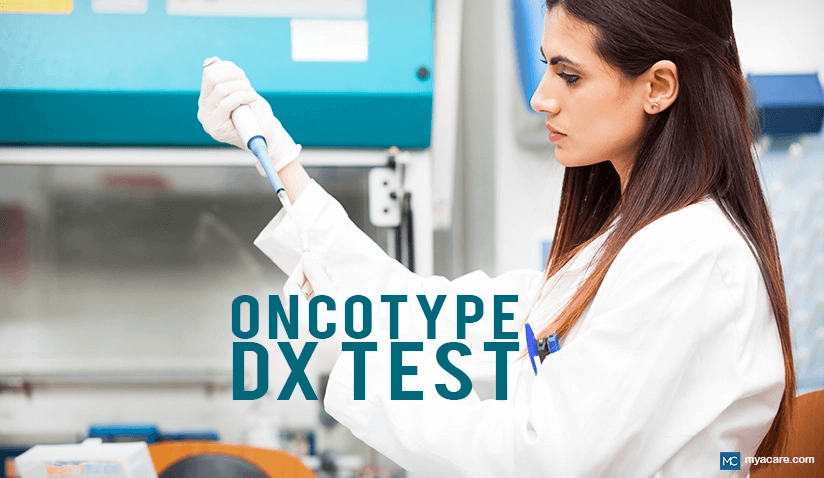What Is an Oncotype DX Test?

How Does the Oncotype DX Test Work?
Breast Cancer Treatment Options
Prostate Cancer and Current Treatment Options
Oncotype DX Test for Prostate Cancer
Colon Cancer and Treatment Options
Oncotype DX Test for Colon Cancer
Oncotype DX Test and Chemotherapy Resistance
Article Updated 25 August 2023
The Oncotype DX test is a genetic test that is done to evaluate a person’s risk of cancer returning in the future. The test is advised by oncologists for people who have cancer of the breast, prostate, and colon. An increasing number of people are being diagnosed with cancer annually. Yet, treating these conditions is often challenging, and it is difficult to know if the cancer is likely to return in the future. This is where the Oncotype DX test comes in handy. Moreoever, this test can accurately indicate the probability of chemotherapy resistance, a condition where cancer cells survive the chemotherapy drugs. This aspect can help doctors personalize treatment modalities that are likely to benefit individual patients.
How Does the Oncotype DX Test Work?
The Oncotype DX test examines the genes found in certain cancer cells. The test is done on a sample removed during a biopsy of the affected tissue. In a biopsy, a small piece of tissue is cut out for further testing.
Genetic testing is then done using the cells of the biopsy. The genetic tests use a molecular procedure known as reverse-transcriptase PCR (RT-PCR). The RT-PCR makes DNA from the RNA extracted from the cancer cells; this then allows scientists to determine the genes.
A score is derived based on the expression of certain types and numbers of genes known to impact cancer. The number of genes screened for in the test depends on the type of cancer in each case.
The BIRC5 Gene
One of the important genes tested for in all the Oncotype DX tests is BIRC5. BIRC5 is associated with several types of cancer. This gene, when expressed in cancer cells, usually indicates a poor prognosis. This is because BIRC5 encourages cell proliferation, which ultimately leads to tumor growth.
The idea is to generate a score based on BIRC5 and similar genes and then use this score to help predict the likelihood of cancer returning in the individual. The results of the Oncotype DX test are also used to plan treatment and management for the patient with cancer.
Breast Cancer and Current Treatment Options
Breast cancer is diagnosed in approximately 264,000 people every year in the United States alone. This is a common type of cancer in which knowing about future risks is useful when planning treatment options.
The choice of treatments for a patient with breast cancer depend on a number of factors. The Oncotype DX test is one of the tools that can help doctors make this decision.
Breast cancer treatment can be done in a number of ways. These are described below:
- Surgery: Removing the breast or part of it where a tumor is found.
- Hormone-blocking medications: Medicines that block hormones that aid cancer growth.
- Chemotherapy: The use of chemicals toxic to cancer cells.
- Radiation therapy: The use targeted radiation beams directed at the cancer's exact location.
- Biological agents: These include antibodies and interleukins that help fight cancer.
Some of the treatment options, particularly chemotherapy and radiation therapy, have unpleasant and potentially harmful side effects. Side effects like nausea, fatigue, and hair loss are common for both radiation and chemotherapy treatments. Having a molecular test to help assess breast cancer can provide physicians with extra information to help them decide if additional or different treatment methods are needed.
Oncotype DX Test for Breast Cancer
The most widely used application of Oncotype DX tests is in people who have breast cancer. The Oncotype DX Breast Recurrence Score test is only recommended for use in certain cases of breast cancer. These are discussed below:
- The breast cancer is estrogen-receptor positive: This means the breast cancer cells can use the hormone estrogen.
- The cancer is human epidermal growth factor receptor-negative: This means that the cells only have a few HER2 proteins. These proteins usually help control cell growth rate. A lack of this protein means cells like cancer, can grow out of control.
- The breast cancer has been classified as stage I, II, or IIIA invasive: The stage indicates the extent of the cancer, and invasive means that the cancer has spread from the point of origin.
Oncotype DX Breast Recurrence Score
The Oncotype DX Breast Recurrence Score can indicate whether or not it is better to have chemotherapy given the side effects of this treatment.
The DX score is based on the activity of 21 genes found in breast cancer cells. The results of the scores are given below:
For women who are 49 and younger, a score of:
- 0 to 20 is a low to medium chance of recurrence and chemotherapy is not recommended.
- 26 and higher indicates a high chance of recurrence and chemotherapy is recommended.
For women who are 50 and older, a score of:
- 0 to 20 indicates a low to medium chance of recurrence and chemotherapy is not recommended.
- 21 and greater indicates a medium to high chance of recurrence and chemotherapy is recommended.
Oncotype DX Breast DCIS Score
There is another Oncotype test for breast cancer called the Oncotype DX Breast DCIS (ductal carcinoma in situ). Ductal carcinoma in situ means that there are cancer cells in the milk duct of the breast. The DCIS score is used to help assess the chance of invasive cancer to help doctors decide if radiation therapy is appropriate.
The Oncotype DX Breast DCIS scores:
- Below 39 means a very low risk of cancer recurrence.
- Between 39 and 54 is intermediate risk of recurrence.
- 55 and higher denotes a high risk of recurrence.
Prostate Cancer and Current Treatment Options
There are over 268,000 cases of prostate cancer in the United States every year. There are various options for prostate cancer treatment including the following:
- Surgery: A prostatectomy where the prostate is removed.
- Ablation: This involves using heat or cold to shrink prostate tissue.
- Hormone therapy
- Chemotherapy
- Radiation
- Immunotherapy: This is where substances are used to stimulate the person’s immune system to kill the cancer.
Oncotype DX Test for Prostate Cancer
An Oncotype Genomic Prostate Score can be used to assess the risk associated with prostate cancer. This score is based on examining 17 relevant genes. The test is recommended for men with low-risk and very low-risk cancer to help doctors make decisions about treatment and management of their patients’ illness.
It is important to determine risk because of the unpleasant side effects and costs associated with cancer treatments such as radiation and chemotherapy. A higher score may mean that additional treatment is advisable. This is ultimately up to the doctor and patient to decide.
Oncotype Genomic Prostate Scores and the associated risks of cancer occurring again:
- Below 26 is low risk
- 26 to 59 is intermediate risk
- Above 59 is high risk
Colon Cancer and Treatment Options
The third cancer where the Oncotype DX test can be used is colon cancer. This cancer affects, on an average, 4% of men and women. Colon cancer is being detected in more young people (younger than 50 years) than previously. There are various treatments available to treat this cancer; these therapies are outlined below:
- Surgery: Removal of cancerous polyps or the cancerous part of the colon.
- Chemotherapy
- Radiation therapy
- Targeted drugs: These are drugs that target specific proteins that help cancer growth.
- Immunotherapy methods
Oncotype DX Test for Colon Cancer
This test uses 12 genes to evaluate the likelihood of recurrence of colon cancer. It is thought that the Oncotype DX colon cancer test should be used to further evaluate what adjuvant therapies besides surgery would be helpful in patients with stage II and III colon cancer.
Oncotype DX Colon Cancer Recurrence Score and risk of recurrence:
- Less than 30 is a lower risk
- Equal to or greater than 41 is a higher risk
In cases where the risk of recurrence is greater, adjuvant therapy may be recommended. This is often chemotherapy or radiation, in addition to surgical removal of cancerous tissue.
Oncotype DX Test and Chemotherapy Resistance
The Oncotype DX test can indicate the likelihood of chemotherapy resistance. Chemotherapy resistance is when cancer cells are able to avoid being negatively affected by chemotherapy drugs.
This is because at least one of the genes, BIRC5, has been found to be associated with some level of chemotherapy resistance. High expression of BIRC5 is linked with poor response to adjuvant chemotherapy in breast cancer patients.
The Oncotype DX test score and the individual expression of particular genes are relevant in planning and deciding on appropriate treatment options for individual cancer patients.
Oncotype DX Test Accuracy and Race
Scientists found that the Oncotype DX test is less accurate for predicting the risk of mortality from breast cancer in black patients. One reason for this may be that the test was originally designed using patients from a less diverse population.
Black women most often develop more aggressive tumors than other race groups, also making the odds of survival from breast cancer lower. Fewer women of this ethnicity were involved in validating the Oncotype DX test during its development. This could also be why it is not as accurate when used for black women.
The Oncotype DX test should still be used, but future tests may need to be modified to include more ethnic diversity which would improve the accuracy of such tests. Tumor characteristics vary by race, so a change is needed in how the Oncotype DX and other tests are used in predicting future disease across race groups.
Conclusion
The Oncotype DX test is a genomic assay that involves examining the genes in cancerous tissue taken during a biopsy. The idea is to use the gene expression of several genes to help assess if a patient’s cancer is likely to return in the future. This is a useful tool that oncologists can use to help plan a course of treatment for their patients. However, it is important to note that the test is not a substitute for clinical judgment. The test results should always be interpreted by a specialist, factoring in the individual patient’s medical history and other relevant parameters. The Oncotype DX test may not always be covered by insurance, so it is advisable to check with your provider. Lastly, being a relatively new test, more research is essential to assess its long-term benefits and risks.
To search for the best Oncology healthcare providers in Germany, India, Malaysia, Singapore, Spain, Thailand, Turkey, the UAE, the UK and the USA, please use the Mya Care search engine.
To search for the best healthcare providers worldwide, please use the Mya Care search engine.

Dr. Rae Osborn has a Ph.D. in Biology from the University of Texas at Arlington. She was a tenured Associate Professor of Biology at Northwestern State University, where she taught many courses to Pre-nursing and Pre-medical students. She has written extensively on medical conditions and healthy lifestyle topics, including nutrition. She is from South Africa but lived and taught in the United States for 18 years.
Sources:
Featured Blogs



